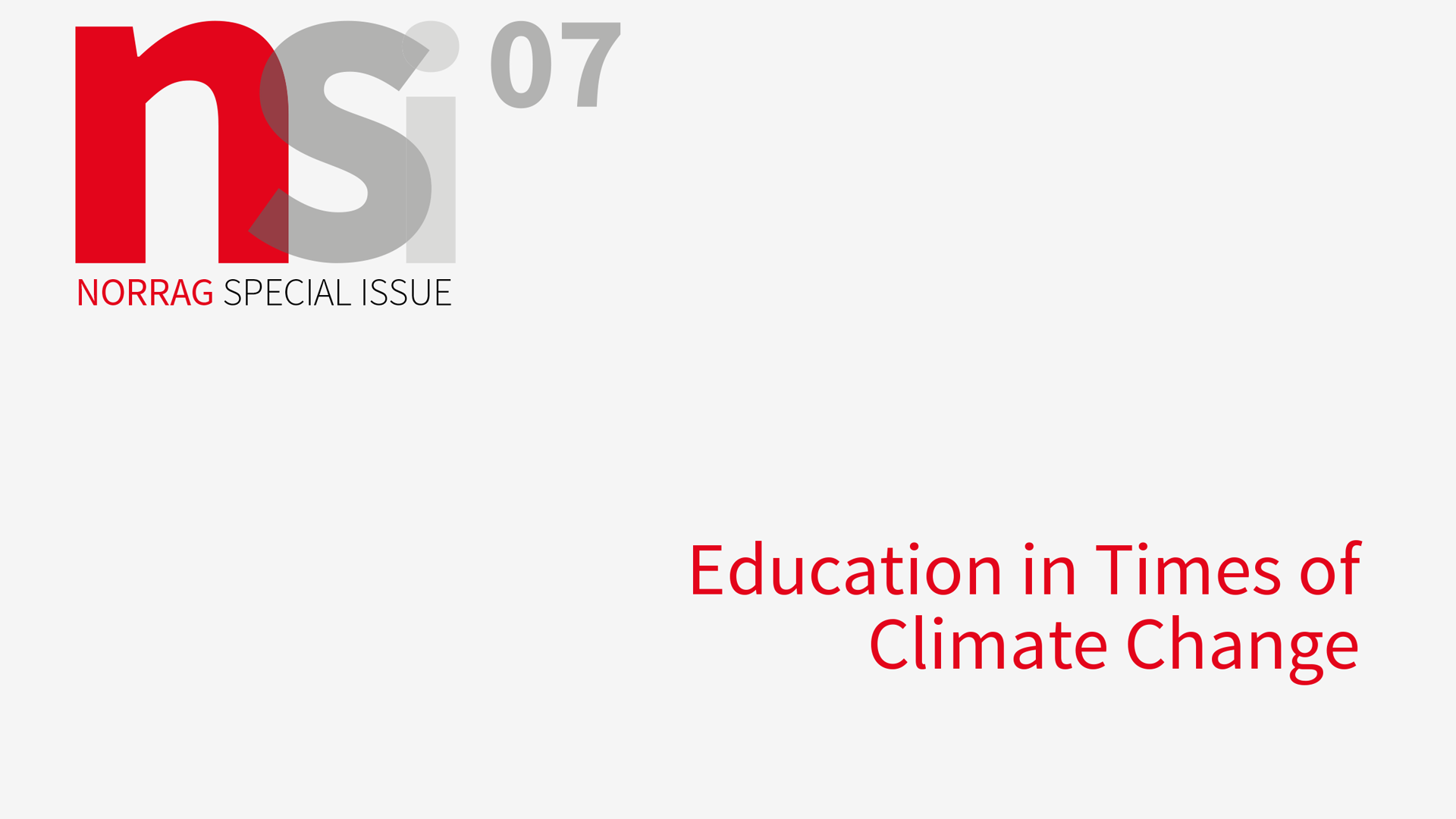Event Highlights: Launch of NSI07 on Education in Times of Climate Change
COMING SOON : Regional Launches of NSI 07 on Education in Times of Climate Change
Chinese version: Sunday 29 October 2023, 2 pm (CST)/ 7 am (CEST)
Russian version: Monday 30 October 2023, 3.30 pm (ALMT) / 10.30 am (CET)
Spanish version : Tuesday 31 October 2023, 11 am (ART)/ 3 pm (CET)
Arabic version: Saturday 11 November 2023, 12 pm (CET)
Event Highlights: Launch of NSI07 on Education in Times of Climate Change
This event highlights is contributed by Distinguished Professor Heila Lotz-Sisitka, SARChI Chair of Global Change and Social Learning Systems at the Environmental Learning Research Centre (ELRC), Rhodes University, South Africa and cross-posted on NORRAG and the ELRC website.
The seventh edition of NORRAG Special Issue (NSI) is entitled “Education in Times of Climate Change.” Produced in partnership with the Rhodes University Environmental Learning Research Centre (ELRC), the journal was launched on 6 October 2022 in an online webinar to an expansive audience.
Cliquez ici pour voir la vidéo en français
Introducing the journal, co-editor Distinguished Professor Lotz-Sisitka, SARChI Chair of Global Change and Social Learning Systems at Rhodes University, acknowledged this important partnership for environmental education globally with NORRAG. NORRAG is an impressive global organisation network for international policies and cooperation in education and training.
Climate change is not a new issue for education. Still, new levels of consensus and concern are emerging that indicate that new policy is emerging to deal with this challenge through education. Introducing the journal to the international audience, Professor Lotz-Sisitka stated, “A key message of this journal is that education in times of climate change must be transformative, if not transgressive.”
Education about the issue is not enough. Instead, we need education for, in, through and with the environment, in community with others, oriented towards alternative futures. “Such education should also be more creative, open-minded, connected, yet critically oriented,” said Professor Lotz-Sisitka. She called on policymakers to avoid over-reliance on top-down policy and instead to join hands with educators who were already producing innovations towards transformative education.
Co-editor Professor Eureta Rosenberg, Chair of Environment and Sustainability Education and Dean of Education at Rhodes University, and moderator of the panel, engaged the dialogue on climate justice, transformative education, and curriculum transformation, amongst other emerging topics. Authors on the panel spoke to much-needed transformations in education, with Professor Rosa Guadalupe Mendoza Zuany from Mexico arguing that the existing paradigm of education excludes parents and communities, and new models are needed that include them.
Professor Holmberg from Sweden talked about humility to change how we approach education. At the same time, Sidney Muhangi, PhD candidate at the ELRC shared the importance of re-framing vocational education and training to be more inclusive and climate responsive. Sarah Van Borek from the ELRC at Rhodes University talked about advancing the ‘unhidden curriculum’, while Professor Christina Kwauk from the USA talked about the shift in approaches to climate change education over time, advocating for more efforts to strengthen empowerment and justice through education.
Speaking from the MECCE project, which is a major initiative focusing on monitoring and evaluation of climate change education worldwide, Professor Aaron Benavot talked about the need for systemic impact and finding leverage points at a system level to shift education in times of climate change.
Concluding the panel discussion, Professor Rosenberg thanked all authors for their contributions and emphasised that “policy is a reflexive learning process in itself”. She encouraged all to access and read the journal.
The launch was concluded by Dr Moira Faul from NORRAG, who shared the many new and exciting initiatives that are emerging in NORRAG. She encouraged participants to join the NORRAG Network, especially also to strengthen the voice of the Global South in education policy initiatives and debates.
About NSI 07: Education in Times of Climate Change
 This NORRAG Special Issue (NSI 07) addresses the question of how education is to equip learners to participate in climate action that would fundamentally disrupt existing problematic systems. NSI 07 showcases what is currently being done to close the gap between the potential of education to contribute to a more sustainable and just world and the experiences of those in education.
This NORRAG Special Issue (NSI 07) addresses the question of how education is to equip learners to participate in climate action that would fundamentally disrupt existing problematic systems. NSI 07 showcases what is currently being done to close the gap between the potential of education to contribute to a more sustainable and just world and the experiences of those in education.
This NSI has the potential to inform pedagogical praxis, co-learning, curriculum, climate action, policy formulation, frameworks for evaluating success, resourcing decisions and what we might consider educative acts for engaging with climate change and its multi dimensional uncertainties, risks and opportunities.
NSI 07 is guest-edited by Distinguished Professor Heila Lotz-Sisitka and Professor Eureta Rosenberg, Environmental Learning Research Centre Rhodes University, South Africa. The 28 articles in the issue are divided into eight parts:
- Part 1 draws lessons across disciplines, issues and contexts.
- Part 2 addresses ways in which we can expand learning and agency across boundaries from three different continents.
- Part 3 goes beyond formal schooling to offer lessons in building transformative learning, activism and relations.
- Part 4 leads the reader past western, rational, techno-scientific ways of knowing to engage diverse knowledges in climate change responses.
- Parts 5 and 6 challenge the reader to listen to and engage with young people and children’s views and voices in climate action.
- Part 7 focuses on higher education responses.
- Part 8 concludes the NSI by considering other places and spaces relevant to education for sustainable and just futures.
NSI 07 is available in English. Regional editions in Arabic, French, Chinese (simplified characters), Spanish, and Russian are also available in the resources library. Select the language at the bottom of the page.

